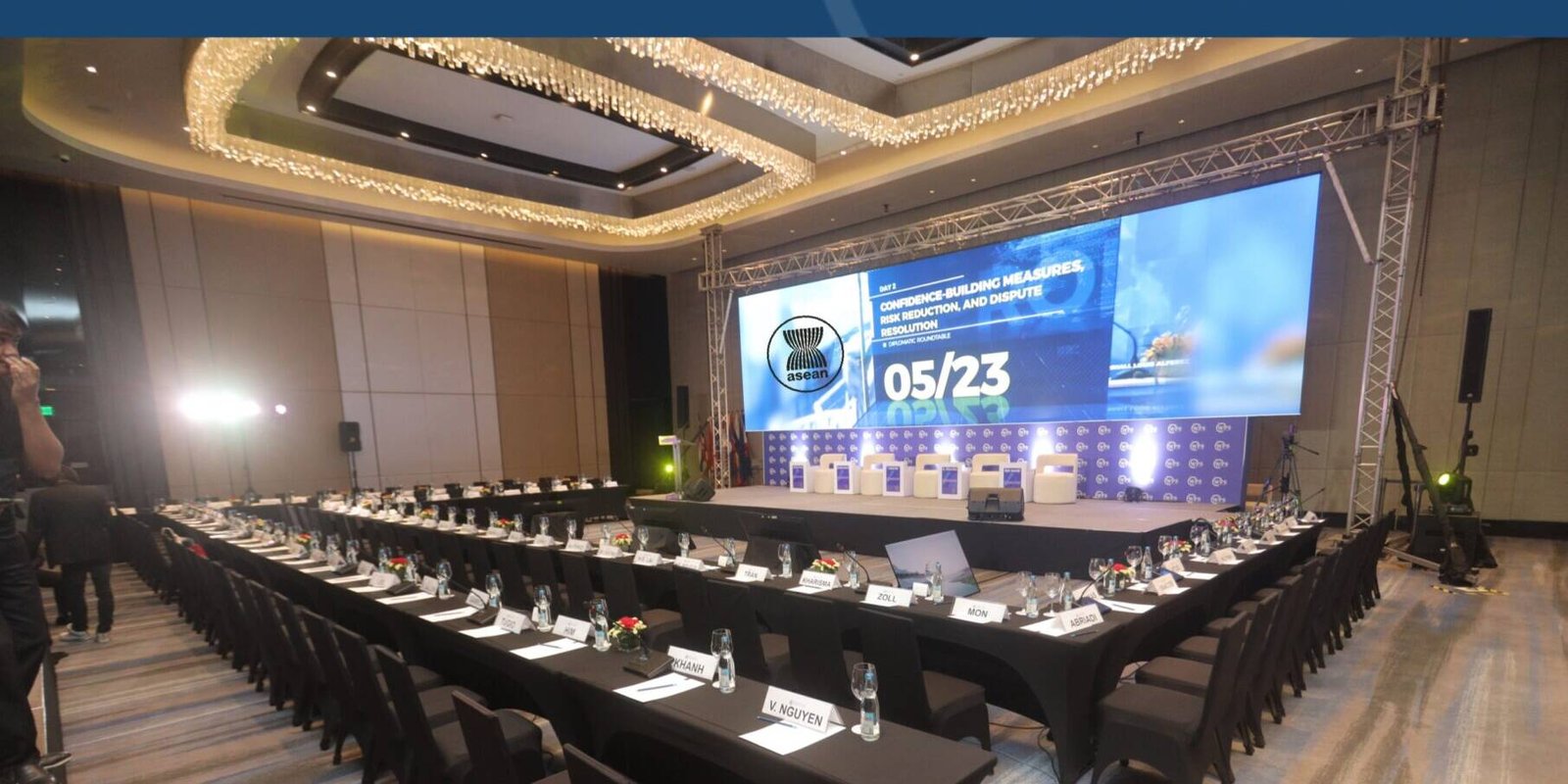PRESS RELEASE
Day 2 of DAMS 2025 Highlights Urgency of Regional Cooperation and Rule of Law in the South China Sea
Manila, Philippines – Experts, officials, and legal scholars gathered at the Day 2 of the Dialogue on ASEAN Maritime Security (DAMS 2025) on Thursday, May 22, in Conrad Manila to discuss pressing maritime challenges in the region, including the South China Sea. The event featured four panel discussions on maritime law, regional security cooperation, fisheries management, and marine environmental protection.
For the first panel, UNCLOS and the Rules-based Order- Understanding South China Sea Claims, legal experts and representatives from Southeast Asian coastal states underscored the primacy of the United Nations Convention on the Law of the Sea (UNCLOS) in governing maritime claims and managing disputes.
“UNCLOS is the Constitution for the oceans. Any regional instrument, including a Code of Conduct, must remain consistent with it,” said Senior State Counsel Fretti Ganchoon of the Philippines’ Department of Justice. She warned against provisions in the COC that could supersede UNCLOS and reiterated that China’s actions have gravely violated the Convention, prompting the 2013 arbitration case filed by the Philippines.
Dr. Huong Nguyen, Director, Center for International Law, East Sea Institute, Diplomatic Academy of Vietnam said: “As coastal states, our maritime entitlements derive from UNCLOS. It remains the legal foundation for maritime zone generation in accordance with international law.” Panelists also raised concerns over the erosion of international norms: “If states don’t follow rules, then might will prevail over right,” warned Ganchoon.
The second panel, Getting Past Constraints— Ideas to Advance ASEAN’s Maritime Security Agenda, explored how ASEAN can enhance its regional security role amid rising tensions and perceived institutional inertia.
“ASEAN must close ranks. Structural and institutional reforms are needed for the bloc to respond more effectively,” said Dr. Thitinan Pongsudhirak, a Professor of International Relations, Faculty of Political Science, Chulalongkorn University. Dr. Chiew-Ping Hoo highlighted the importance of resuming negotiations with China on a binding Code of Conduct, noting that “the pandemic saved China from fulfilling its commitments.” Others stressed practical steps for building trust. “There are far more proposals on security cooperation than on confidence-building,” said Dr. Collin Koh, Associate Professor, S. Rajaratnam School, Nanyang Technological University. Don McLain Gill, Lecturer at the Department of International Studies of the De La Salle University echoed the sentiment, urging stronger norms around interoperability, capacity-building, and information-sharing across ASEAN states. Dr. Jeffrey Ordaniel, President & CEO of WPS, who chaired the panel underscored the value of UNCLOS vis-a-vis ASEAN’s search for an effective dispute management mechanism. “UNCLOS allows us to assess the reasonableness of claims. If two EEZs overlap. That’s a legitimate dispute that can generate reasonable compromise and cooperation,” Ordaniel said while noting that claims not based on international law inhibit any form of mutually agreeable solutions.
In Panel 3, Examining Regional Fish Stocks Management, experts painted a sobering picture of the region’s fisheries, with stocks declining by up to 95% since the 1950s. Unsustainable practices such as giant clam harvesting, dredging, and artificial island construction have devastated coral ecosystems across over 160 square kilometers. Panelists Isara Chanrachkij, Director, Project Planning and Management Division, Training Department, Southeast Asian Fisheries Development Center; Prof Sazlinah Salleh, Deputy Director, Center for Policy Research, Universiti Sains Malaysia; Dr. Charina Lyn Amedo-Repollo, Assistant Professor, Deputy Director for Research, Marine Science Institute, University of the Philippines; and Dr. Chien Thai, Division Chief, Capture Fisheries and Resource Management Department, Research Institute for Aquaculture Number 3, called for an urgent multi-pronged approach: sustainable fishery practices, habitat restoration, marine aquaculture, technological innovation, and greater public awareness. These measures are vital to protect food and human security in the region.
Discussions on the last panel, Promoting Energy Security, Environmental, emphasized that semi-enclosed seas like the South China Sea require coordinated environmental stewardship, as mandated by UNCLOS Articles 123 and 192.
“We are custodians of nearly half the world’s coral species,” said Dr. Sau-Pin Woo, Deputy Director, Centre for Marine and Coastal Studies, Universiti Sains Malaysia, warning of dire global consequences if ASEAN fails to protect its marine ecosystems. Dr. Woo also highlighted the disconnect between scientific knowledge and policymaking: “Scientists seek data, but we must also understand how that knowledge can be a tool for diplomacy.”
The panel urged greater regional collaboration, capacity-building, and a strengthened role for the ASEAN scientific community in supporting marine environmental protection initiatives. “We need to collectively work together especially on environmental protection, we need the Asean scientific community to support this initiative,” said Prof. Dindo Manhit, CEO and Founder, The Stratbase Group.
Representatives from all ten member states of ASEAN gathered for DAMS 2025, a three-day forum held at Conrad Manila from May 21 to 23, which will see discussions on several issues related to maritime governance. The Track 1.5 event, hosted by non-government organization We Protect Our Seas, serves as the sherpa to The Manila Dialogue on the South China Sea in November.

Related In-the-Media
January 8, 2026
Outcome Document | The Manila Dialogue on the South China Sea 2025
0 Comments2 Minutes



